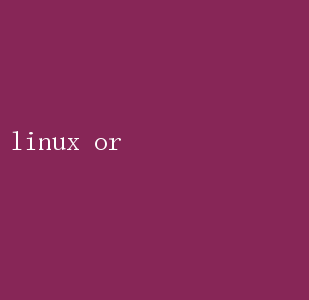
Linux or Windows: The Ultimate Operating System Debate Resolved
In the realm of computing, the debate between Linux and Windows has persisted for decades, pitting two powerful operatingsystems (OS) against each other in a battle for supremacy. Each OS has its loyalists who swear by its merits, while detractors often highlight its shortcomings. However, rather than viewing this as a zero-sum game, its crucial to understand that the choice between Linux or Windows often boils down to individual needs, preferences, and use cases. This article aims to dissect the core strengths and weaknesses of both operating systems, offering a comprehensive guide to help you make an informed decision.
Linux: The Powerhouse for Developers and Power Users
Linux, an open-source Unix-like OS, has garnered a cult-like following among developers, sysadmins, and power users. Its origins trace back to the early 1990s when Linus Torvalds created the first version as a personal project. Since then, Linux has evolved into a robust, versatile, and highly customizable OS, powering servers, supercomputers, and a significant portion of the internets infrastructure.
1. Open Source and Customizability
One of Linuxs most compelling attributes is its open-source nature. This means that anyone can inspect, modify, and distribute the source code, fostering a community-driven approach to development. This transparency not only enhances security but also allows for endless customization. From lightweight distributions like Lubuntu for older hardware to full-featured desktops like Ubuntu, Linux offers a distribution(distro) to cater to every users taste.
2. Robust Security
Linuxs security reputation precedes it. Due to its Unix heritage and the communitys proactive approach to patching vulnerabilities, Linux-based systems are generally more secure than Windows. Malware targeting Linux is relatively rare, and even when it does occur, the impact is usually mitigated swiftly. This makes Linux an excellent choice for sensitive applications such as banking, finance, and government services.
3. Efficiency and Performance
Linux is renowned for its efficiency, particularly in resource management. It can run smoothly on older hardware, providing a breath of life to aging computers. This efficiency extends to servers, where Linuxs ability to handle heavy loads with minimal resource consumption makes it a favorite among web hosting providers and cloud services.
4. Rich Ecosystem for Developers
For developers, Linux is a paradise. It offers a wide array of programming languages, tools, and libraries, making it the go-to OS for software development. Whether youre working on web applications, mobile apps, or system software, Linux provides a seamless environment. Moreover, the extensive documentation and community support make troubleshooting and learning new technologies easier.
5. Free or Low-Cost
Most Linux distributions are free to download and use, supported by community contributions and occasional donations. While some distros offer paid versions with additional features or support, the core OS remains freely available. This makes Linux an attractive option for budget-conscious users and organizations.
Windows: The Mainstay for General Consumers and Gamers
Windows, developed by Microsoft, is the dominant OS in the consumer market. Its ubiquitous presence in homes, schools, and businesses underscores its versatility and ease of use. Windows popularity is a testament to its ability to cater to
